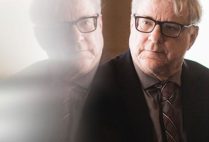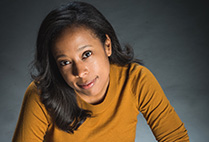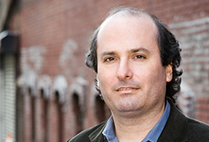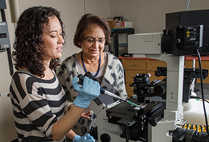ENG’s Carlo De Luca Was a “World-Leading Innovator”
By Sara Cody
Carlo J. De Luca, 72, a College of Engineering professor emeritus of biomedical engineering and of electrical and computer engineering, died on July 20, 2016.
Before he joined the BU faculty in 1984, De Luca had been a faculty member at MIT, Harvard Medical School, and Queen’s University. He was also a School of Medicine research professor of neurology and a Sargent College of Health & Rehabilitation Sciences professor of physical therapy. De Luca, who earned a doctorate from Queen’s University, served as ENG dean ad interim from 1986 to 1989. He played a leading role in ENG’s early development as a research institution.
Kenneth Lutchen, dean of ENG, points to De Luca’s impact on the college’s early efforts to establish a research portfolio. “Carlo was the director of the NeuroMuscular Research Center and was probably the first real star research faculty recruited to the College of Engineering,” he says. “His reputation helped attract some of the leading faculty thereafter. Our standards of excellence as a research college perhaps started with Carlo.”
De Luca is known for introducing engineering principles to the field of electromyography, a diagnostic procedure that records electrical activity in muscle tissue. He founded Delsys, Inc., in 1993, a company that produces wearable sensors for movement technology. He was its president and CEO until his death.
“Carlo De Luca was a world-leading innovator in using engineering methods to study human motor function,” says John White, an ENG professor and chair of biomedical engineering. “Many of the textbook findings in this research area were due to Carlo’s efforts. He was a critical early hire in building the research reputation of the College of Engineering.”
De Luca was a founding fellow of two bioengineering societies: the American Institute for Medical and Biological Engineering and the Biomedical Engineering Society. He served a term on the National Advisory Council for Biomedical Imaging and Bioengineering of the National Institutes of Health and two terms as president of the International Society of Electrophysiological Physiology. He was also the founder and president of the Neuromuscular Research Foundation.
Among De Luca’s awards are the 2012 Borelli Award from the American Society of Biomechanics, the 2006 Tibbetts Award from the Small Business Technology Council of the USA, and the 1999 Isabelle and Leonard H. Goldenson Technology Award from the United Cerebral Palsy Foundation.

Elaine Lewis’ approach to computers and communication helped shape the College of Communication, says Tobe Berkovitz, a COM associate professor of advertising. Photo by Kalman Zabarsky
COM’s Elaine Lewis Was Forward-Thinking
By Kyler Sumter (COM’19)
Elaine Lewis, 61, a former College of Communication assistant professor of mass communication, died on March 11, 2016.
Lewis joined the faculty in 1981, and was “a groundbreaking professor at COM,” says Tobe Berkovitz, a COM associate professor of advertising. “Her forward-thinking approach to computers and communication helped shape the college. She was dedicated to her students and to developing curriculum that became a foundation for many of the programs at COM.”
Lewis grew up in Mattapoisett, Mass., and earned a bachelor’s degree in interdisciplinary visual studies from Wellesley College, a master’s in communication arts from Cornell University, and a PhD from Rensselaer Polytechnic Institute. She focused her research on standards for computer-generated imagery and mathematical modeling of cognitive processes.
During her long and varied career, Lewis held several research design positions at institutions including MIT, Cornell University, and Ergometrica in Cambridge. She served on the board of the Boston chapter of the Association for Women in Communications and was an editor of the International Communication Association’s Communication Yearbook. She codeveloped the Productivity Index methodology, which helps businesses maximize efficiency, and conducted studies for several corporations, among them Apple Computer and United Airlines.
“I always found my conversations with Elaine not only pleasant, but informative,” says Otto Lerbinger, a COM professor emeritus of public relations, who worked with Lewis in the 1980s. “We often talked about her special interest in communication graphics.” That interest led to her helping to establish the Boston University Photonics Center. She was also codirector of BU’s Project for Interdisciplinary Research in Information and served on the executive board of the BU Communication Research Center.

During Richard Nesmith’s tenure as dean, STH saw a rapid increase in the number of female students and an increase in the number of women and ethnic minority faculty members. Photo by Boston University Photography
STH’s Richard Nesmith a Leader in Social Justice
By Neal F. Fisher (STH’60, GRS’66)
Richard D. Nesmith (GRS’57), 88, a retired School of Theology professor of Christian social ethics and former dean of STH, died on March 1, 2017.
Nesmith was a leader in helping ministerial students and church bodies relate to the issues of racial justice, war, and peace, and in strengthening the role of women in church and society. He was instrumental in the Inner City Parish in Kansas City, which linked the primarily African American churches with the instructional program of Saint Paul School of Theology. From 1969 to 1974, he was director of planning at the United Methodist Board of Global Ministries in New York City, helping the national denomination provide leadership on issues of social justice in cities and rural communities.
Nesmith’s teaching often occurred in student field visits, in addition to in the classroom. In his undergraduate teaching and his teaching at Saint Paul, he encouraged students to engage in grassroots community issues as part of their education. He spent time in a Montgomery, Ala., jail for taking Northern white students on visits with African American leadership in the city following the successful 1955–1956 bus boycott that resulted in the integration of the Montgomery bus system. He was convicted of “conduct calculated to provoke a breach of the peace.” He declined an offer to be dismissed with a fine, and appealed the case until the verdict was reversed and court costs reimbursed by the US Circuit Court of Appeals for the Fifth Circuit, in 1963. The Court of Appeals ruled the arrest “illegal as a matter of law.”
From 1989 to 1997, Nesmith and his second wife, Patricia Nichols Toscano, worked on a United Methodist Television series, Perspectives: Faith in Our Times, he as moderator and she as associate producer. The series featured interviews with national figures representing church, society, and politics, and was carried nationally on the Odyssey network.
Nesmith was an ordained minister in the United Methodist Church. Born on a family ranch in western Nebraska, he completed his AB studies at Nebraska Wesleyan University. He prepared for Christian ministry at Garrett Theological Seminary, on the campus of Northwestern University, earning an MDiv in 1953. He received a PhD in Christian social ethics in 1957. He also completed a certificate of ecumenical studies at the Bossey Institute in Switzerland. Nesmith was a professor of sociology and dean of students at MacMurray College from 1958 to 1961, and a professor of Christian social ethics at Saint Paul School of Theology from 1962 to 1968.
He served as senior pastor of the Trinity United Methodist Church, in Lincoln, Nebr., for three years before being appointed dean of STH and a professor of Christian social ethics in 1979. For 13 years he led a graduate professional school affected—along with other educational institutions—by trends and volatile issues in church and society. During his tenure, the school saw a rapid increase in the number of female students and an increase in the number of women and ethnic minority faculty members. From 1993 until his retirement in 2001 he continued as a full-time professor of Christian social ethics.
Gifts in memory of Richard D. Nesmith may be sent to the Boston University School of Theology, 745 Commonwealth Avenue, Boston, MA 02215. All gifts will go to the STH Scholarship Fund.















































Related Stories
Klamkin Receives NASA Early Career Faculty
Recognized for efforts to improve deep space communication
Changes Ahead for BU: Grad Programs, Faculty Governance, More
President issues precommencement State of the University
Eight Charles River Campus Faculty Promoted to Full Professor
Studies include military families, neurobiology, Holocaust history, nanophotonics
Post Your Comment